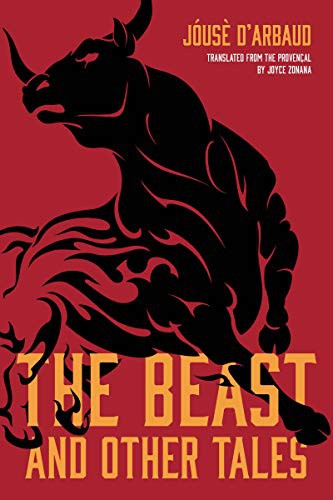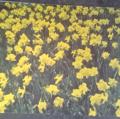Stephanie Jane recenzis The Beast, and Other Tales de Joyce Zonana
An interesting though uneven quartet of stories
4 steloj
Jouse d'Arbaud was a French author, but particularly a Provençal author who was prominent in an artistic movement to preserve traditional Provence culture and language. His determination to experience the true life of this historic region led him to uproot himself from his urban home and to start anew as a Camargue bullherder, living spartanly very much as the gardian hero of The Beast would have done some five centuries earlier. This now-classic novella was initially published in a bilingual Provençal/French edition and I was interested in present-day translator, Zonana's, note that the Provençal was by far the more vivid and charismatic version.
The Beast reads much like a fairytale in structure with a demonic yet poignant mystery creature at its heart. I would describe it perhaps as somewhere towards John Steinbeck's The Pearl, but with an intense sense of place reminiscent of The Farm by Hector Abad. d'Arbaud's deep …
Jouse d'Arbaud was a French author, but particularly a Provençal author who was prominent in an artistic movement to preserve traditional Provence culture and language. His determination to experience the true life of this historic region led him to uproot himself from his urban home and to start anew as a Camargue bullherder, living spartanly very much as the gardian hero of The Beast would have done some five centuries earlier. This now-classic novella was initially published in a bilingual Provençal/French edition and I was interested in present-day translator, Zonana's, note that the Provençal was by far the more vivid and charismatic version.
The Beast reads much like a fairytale in structure with a demonic yet poignant mystery creature at its heart. I would describe it perhaps as somewhere towards John Steinbeck's The Pearl, but with an intense sense of place reminiscent of The Farm by Hector Abad. d'Arbaud's deep love of the Camargue landscape and it's nature is wonderfully evident across every page and, having spent a little time in this region myself, I can can completely empathise. I felt as if The Beast itself could be a metaphor for the then-dwindling Camargue culture and way of life. To me this is even more significant now, almost a century later, as rising sea levels mean the whole area will soon be lost to floods leaving d'Arbaud's writing as a lone reminder.
The Beast was very much the star of this story quartet for me. The other three works are shorter and felt less developed although, as they share commonalities of place and characters, it made sense for them to be included. Pere Guilham's Remorse is particularly disturbing as it includes some pretty graphic scenes of animal torture (bullfighting is one tradition I will happily see flooded into oblivion!), but The Caraco was interesting with its focus on social exclusion amongst already solitary peoples. Although I admit that, prior to seeing this collection on NetGalley, I hadn't heard of d'Arbaud myself, I am surprised that he isn't more renowned in the French-speaking world. Perhaps his determination to be Provençal over French was the reason? Either way, these stories are a valuable record from a historical perspective and also an entertaining read.

